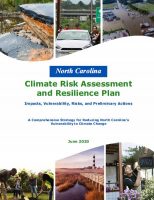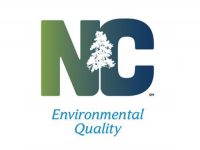 Officials announced Thursday a new initiative to help the state prepare for the affects of climate change while reducing damages from future disasters such as hurricanes, flooding and wildfires.
Officials announced Thursday a new initiative to help the state prepare for the affects of climate change while reducing damages from future disasters such as hurricanes, flooding and wildfires.
The N.C. Office of Recovery and Resiliency, or NCORR, in the Department of Public Safety, N.C. Division of Coastal Management, or DCM, in the Department of Environmental Quality and the N.C. Rural Center established the N.C. Resilient Communities Program to help local governments build capacity for resiliency, provide technical assistance and fund planning and implementation of strategic resilience projects.
Supporter Spotlight
NCORR and DCM staff will lead the new N.C. Resilient Communities Program announced at the N.C. Climate Change Interagency Council meeting Thursday and work with partners across state agencies and community organizations.
Public input collected during development of the Resilience Plan emphasized that building local resilience required access to resilience expertise, support for analysis planning and funding to implement measures that advance long-term resilience. To address these needs, the state established the North Carolina Resilient Communities Program.
The program is a priority in the state’s Climate Risk Assessment and Resilience Plan and underscores Gov. Roy Cooper’s commitment to building climate change resiliency statewide while promoting economic growth and stability, according to the state.
“With two 500-year storms in less than two years, our state must be more resilient to disasters and the impacts of climate change,” said Cooper. “We know that funds and technical support are needed at the local level to assess risks and find creative solutions. The N.C. Resilient Communities Program will help local and regional governments plan and implement projects that support resilient communities, economies and ecosystems.”
NCORR, DCM and the N.C. Rural Center secured $3.4 million in state and federal grant funding to implement the program, which will begin with coordinated efforts targeting multiple regions.
Supporter Spotlight
 The DCM Resilient Coastal Communities Program will focus on the state’s coastal zone, funding up to 20 coastal communities to conduct risk and vulnerability assessments of their populations and critical assets, to prioritize and design resilience-building projects, and position themselves to compete successfully for construction funding.
The DCM Resilient Coastal Communities Program will focus on the state’s coastal zone, funding up to 20 coastal communities to conduct risk and vulnerability assessments of their populations and critical assets, to prioritize and design resilience-building projects, and position themselves to compete successfully for construction funding.
“We are helping our communities rebuild stronger and smarter to withstand the increasingly frequent disruptions caused by climate-driven hazards,” said DEQ Secretary Michael S. Regan. “Dealing with COVID-19 in the midst of the hurricane season has further stretched already limited resources, so we are pleased to provide technical and financial assistance to bolster local capacity for resilience planning to help protect our communities, our natural resources and the coastal economy.”
The Resilient Communities Program managed by NCORR and the N.C. Rural Center will produce for phase one a statewide resilience framework and guidebook for local communities. Phase two of that program will focus on regional training and technical assistance for eastern North Carolina counties. With additional funding and staff secured over time, the N.C. Resilient Communities Program will expand to provide opportunities to communities statewide.
“Preventing damage from future disasters is a critical part of the Department of Public Safety mission,” said DPS Secretary Erik A. Hooks. “As climate change impacts increase, North Carolina faces increased risk of floods, hurricanes and wildfires. Through our Divisions of Emergency Management and NCORR, we are committed to helping local governments find innovative ways to become more proactive and resilient.”
The Rural Center and NCORR will host this month a series of seminars for rural leaders to learn more about the program. Information on the Building on Higher Ground: Community Resilience Strategies for the Storms to Come series is available on the N.C. Rural Center website. To learn more about the state agency partnership, visit the NCORR Resiliency Program and DCM Resilient Coastal Communities Program websites.







